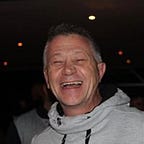The ability to choose is a basic human need.
The debate on whether we have has been going on for centuries among philosophers and psychologists. On the one hand, a recent neuroscientific study revealed the brain of subjects who were asked to raise their arm, actually ‘fired’ before the participants became aware of their decision to move their arm. The researches went on to conclude that neurobiology was likely in control of our actions, not our own free . Others argue, however, that a freely-made choice simply triggers the brain’s activity before a person is consciously aware of it.
I like to believe that I have some control over what I think, do and say.
In Maslow’s Hierarchy of Needs, Abraham Maslow proposed the theory that human motivation is based on a set of needs. The most basic needs, Physiological needs, are considered the most basic of human needs in order for survival. This formed the basis of Maslow’s theory, and suggests that if our basic needs are not fulfilled, a person will not be motivated to address higher ‘needs.’
The needs that follow up the pyramidare Safety, Social belonging, Self-esteem, Self-actualisation and later he added a seventh level, Transcendence, that speaks to altruism or spirituality.
Research conducted at Cornell University, estimates we make 226 decisions each day on food alone. On average an adult makes about 35,000 remotely conscious decisions each day. Each decision carrying with it certain consequences that are both good and bad. And therein lies the challenge. How do we decide what choices to make that will result in a good outcome? It turns out, the very first thing our brain does, is to decide which of these strategies to use to make the best decision.
- Impulsiveness — using the first option presented
- Delegating — passing on making the decision and handing it to someone else to make
- Prioritizing and Reflecting — Paying attention to which decision will have the most impact.
- Avoidance/deflection — Avoiding or ignoring decisions to avoid the responsibility for their impact
- Compliance — The most popular and comfortable option without considering the impact
- Balancing — Considering the various options and weighing them up against each other
We use any combination of these strategies to come up with the best choice at the time. With so many decisions to make, our brain acts swiftly to find the best strategy. The instant the strategy is chosen, the choice is generated. However, Acting on the choice is where our power lies. The power to choose presents endless possibilities. An example.
The desire to improve is a choice.
The need to be better, to improve as a person, regardless of which level of Maslow’s Hierarchy you’re on, is a choice. The choice to be a better you could be the most powerful choice you make today. Choosing to be a better you, opens possibilities that guarantee a good outcome.
Use your Power to Choose to make the world a better place. Start by choosing you.
Have an awesome weekend. 😉
Originally published at https://www.leapfirst.co.za on July 24, 2020.
